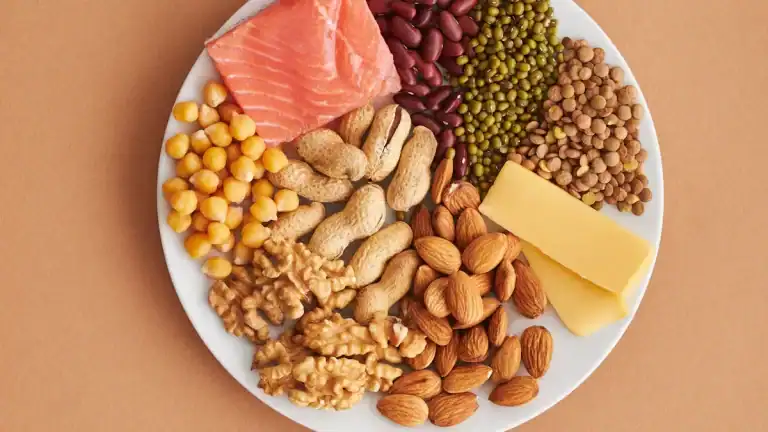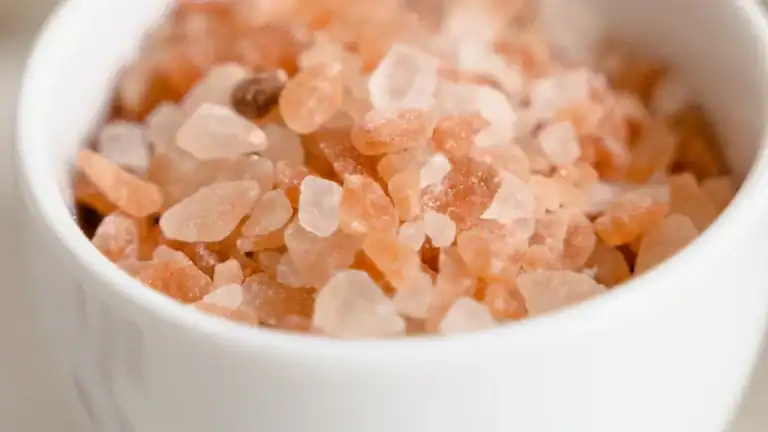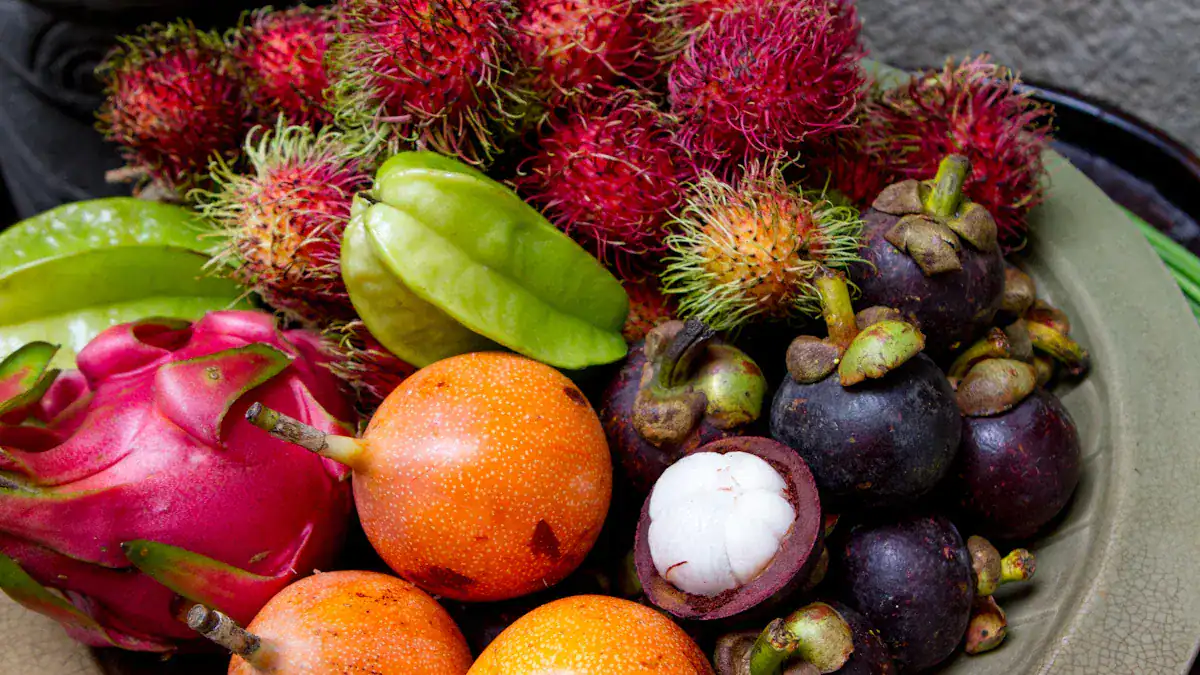
Step into a world of vibrant colors and unique flavors with exotic fruits. These treasures offer more than just taste. They pack unique nutrients that significantly boost your overall wellness and vitality. A diet rich in fruits and vegetables consistently reduces the risk of heart disease, certain cancers, and all-cause mortality.

This data highlights the profound health benefits such foods have on your body. Incorporating exotic fruits can be a simple yet powerful step towards a healthier, more energetic life.
Key Takeaways
Exotic fruits offer many health benefits. They boost your body’s defenses and help your digestion.
These fruits are full of vitamins and antioxidants. They protect your cells and reduce swelling in your body.
Eating exotic fruits can make you feel more energetic. They also help your skin look healthy.
You can easily add exotic fruits to your daily meals. Try them in salads, smoothies, or as snacks.
Dragon Fruit Health Benefits
Immunity and Skin Health
Dragon fruit offers significant health benefits, especially for your immune system and skin. It contains powerful compounds that help your body stay strong. Betacyanins and betaxanthins act as antioxidants. They neutralize harmful free radicals. This action prevents inflammation and supports your immune health. Dragon fruit also has oligosaccharides.
These carbohydrates act as prebiotics. They encourage good gut bacteria to grow. This growth enhances your immune system and reduces infection risks. Prebiotics in dragon fruit feed healthy gut bacteria like lactobacilli and bifidobacteria. These bacteria fight off disease-causing viruses and bacteria. This strengthens your immunity, boosting immunity. The fruit is also rich in Vitamin C and other antioxidants. These nutrients help maintain healthy immunity. These properties also contribute to its anti-aging effects, keeping your skin looking vibrant.
Antioxidant Properties
Dragon fruit is a powerhouse of antioxidants. These compounds protect your cells from damage. Red-fleshed dragon fruit varieties contain betalains. These antioxidants combat oxidative stress.
They also help reduce total cholesterol and other health risk factors. You will also find hydroxycinnamates in dragon fruit. These compounds may help prevent cancer. Flavonoids are another important group of antioxidants present. They link to better brain health. They also reduce your risk of heart disease.
Digestive Support
Dragon fruit is excellent for improving digestion. It provides significant digestive benefits. A 1-cup serving gives you 5.6 grams of fiber. This amount contributes greatly to your daily needs.
Nutrient | Amount per 1-cup serving |
|---|---|
Calories | 103 |
Fat | 0 grams |
Fiber | 5.6 grams |
Carbohydrates | 27.4 grams |
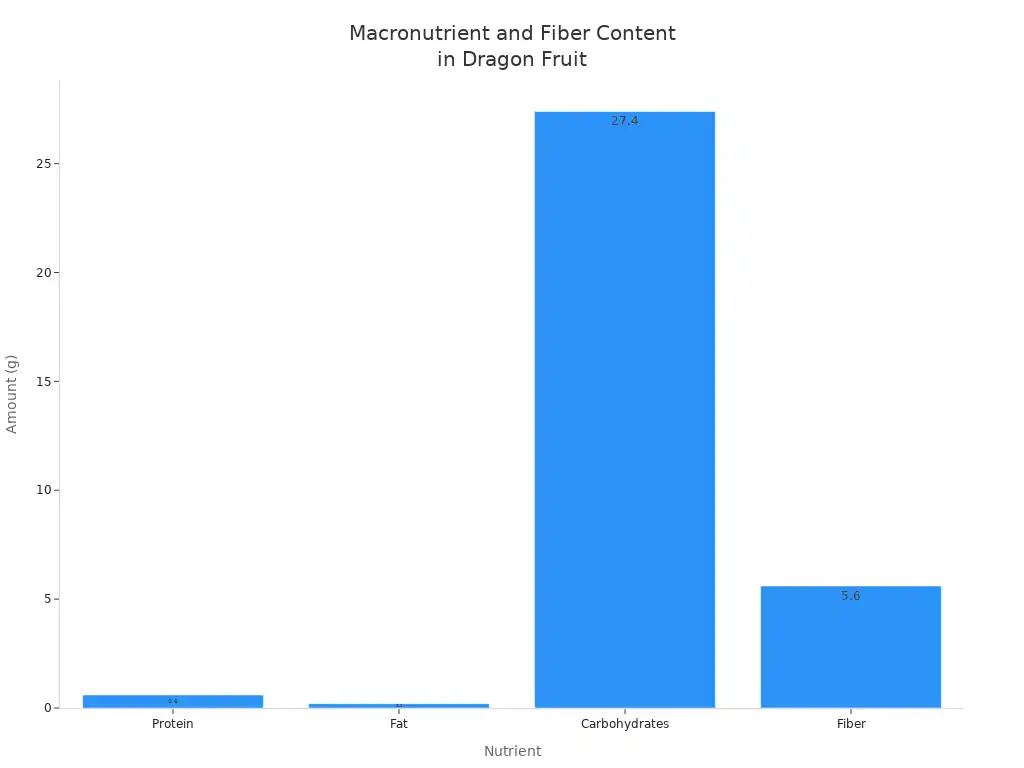
This nutrient supports your gastrointestinal health. Dragon fruit acts as a prebiotic. It boosts the growth of beneficial gut bacteria. These include lactobacilli and bifidobacteria. This action aids digestion and may lower colon cancer risk. Dragon fruit contains prebiotics. These specific types of carbohydrates promote healthy gut bacteria growth.
They are indigestible by your gut but feed your gut bacteria. Regular intake of prebiotics helps balance good bacteria. This can reduce digestive tract infections and diarrhea. The fruit’s water content and its unique gel-like soluble components support healthy digestion. They also promote regular bowel movements. Its small black seeds can help clear your intestines. This makes it effective at relieving constipation.
Mangosteen Benefits
Anti-Inflammation
Mangosteen earns its title as the “Queen of Fruits” for good reason. It offers powerful anti-inflammatory properties. You find special compounds called xanthones in mangosteen. These are unique plant compounds. They have strong antioxidant properties. These xanthones help your body fight inflammation. The rind of mangosteen contains several of these important compounds. These include alpha-mangostin, beta-mangostin, and gamma-mangostin. Other compounds like gartanine and garcinone E are also present. Flavonoids and tannins add to these benefits. These substances work together. They inhibit key inflammatory pathways in your body.
Heart Health
Mangosteen can also support your heart health. Xanthones, found in mangosteen, act as protective agents for your cardiovascular system. A study looked at people who drank mangosteen juice. Obese subjects who consumed 18 ounces daily showed a significant drop in C-reactive protein (CRP) levels. CRP is a marker that predicts heart disease. It also signals a risk for metabolic syndrome. This reduction suggests mangosteen may help prevent heart problems. You can safely consume this fruit. It offers these health benefits without reported side effects.
Cellular Protection
Mangosteen protects your cells from damage. It uses several methods to do this. The fruit’s shell is very good at scavenging harmful hydroxyl radicals. This protects your DNA from oxidative damage. Mangosteen also chelates metals like iron and copper. These metals can create damaging radicals. By binding to them, mangosteen stops this process. It also directly scavenges radicals. It does this by donating hydrogen atoms or electrons. For example, gamma-mangostin gives up hydrogen atoms. This turns unstable radicals into stable molecules. These actions result in the oxidation of xanthones. They form a stable quinone. This process keeps your cells healthy and protected.
Lychee Benefits
Heart Support
Lychee offers great support for your heart. It contains powerful plant compounds called polyphenols. These include proanthocyanidins, catechins, and flavanols. These antioxidants help keep your blood vessels healthy. They also maintain a good balance in your body’s processes. Lychee also provides Oligonol. This special polyphenol comes from lychee. Your cells absorb it easily. Studies show that taking Oligonol daily improves blood flow in tiny vessels. It helps your capillaries respond well, even under stress. Oligonol protects the lining of your blood vessels. It also supports normal nitric oxide activity. This keeps your blood flowing smoothly and your heart healthy. When you combine lychee’s Oligonol with green tea polyphenols, it works even better. This mix boosts antioxidants and helps your circulation, energy, and cell protection.
Bone Strength
You can also strengthen your bones with lychee. This fruit contains important minerals. These include copper, potassium, phosphorus, magnesium, and manganese. These nutrients work together to support strong bones. They help maintain your bone density. Fruits and vegetables like lychee also provide alkaline-forming components. These include potassium, calcium, magnesium, and vitamin C. These components help balance the acid from your diet. They improve how your body uses calcium. This directly supports your bone health.
Polyphenol Rich
Lychee is very rich in polyphenols. These plant compounds act as strong antioxidants. They protect your cells from damage. This damage can come from inflammation, stress, aging, and pollution. Lychees have more polyphenols than many common fruits. Apples and melons have fewer. The skin of lychee, called the pericarp, is full of these substances. You will find phenolic acids, flavonoids, and proanthocyanidins. Specific examples include epicatechin, procyanidins, and cyanidin-3-glucoside. Other compounds like quercetin-3-rutinoside and kaempferol are also present.
Rambutan Benefits
Energy Boost
Rambutan can give you a natural energy boost. This fruit is rich in carbohydrates. These are your body’s main source of energy. A one-cup serving of rambutan provides 15–20 grams of carbohydrates. These are essential for energy production. Rambutan also contains vitamin B5. This vitamin plays a crucial role. It helps your body convert food into energy. Eating rambutan can help you feel more active and less tired throughout your day.
Iron Content
Rambutan is a good source of iron. Iron is vital for carrying oxygen in your blood. It helps prevent fatigue. You can see the iron content in different forms of rambutan:
Rambutan Type | Iron Content | Serving Size |
|---|---|---|
Fresh Rambutan | 0.6 mg | 190 grams |
Rambutan in Syrup | 0.71 mg | 140 grams |
Including rambutan in your diet helps you meet your daily iron needs. This supports healthy blood and energy levels.
Digestive Aid
Rambutan offers significant benefits for your digestive system. It contains two types of fiber that promote a healthy digestive system. The flesh of rambutan is rich in soluble fiber. This helps maintain the smooth functioning of your digestive system. This soluble fiber also aids in reducing gut inflammation. It does this by assisting ‘good’ bacteria in your gut. These bacteria produce short-chain fatty acids.
Here are the two types of fiber in rambutan:
Insoluble Fiber: This makes up 50% of the total fiber content. It passes through your intestines undigested. It adds bulk to your stool. This speeds up intestinal transit. It helps reduce constipation.
Soluble Fiber: This serves as nourishment for beneficial gut bacteria. These bacteria produce short-chain fatty acids. Examples include acetate, propionate, and butyrate. These acids feed your intestinal cells. They decrease inflammation. They also alleviate symptoms of intestinal disorders. These include irritable bowel syndrome (IBS), ulcerative colitis, and Crohn’s disease.
Eating rambutan regularly supports improving digestion and overall gut health.
Passion Fruit Benefits
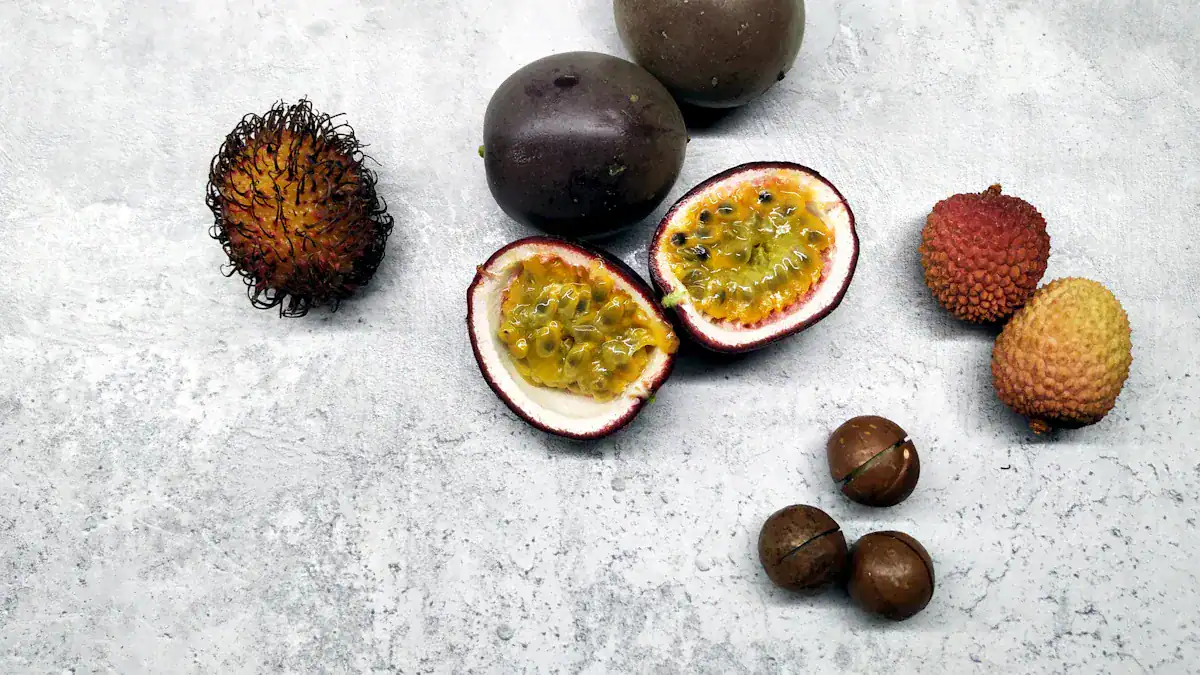
Stress Reduction
Passion fruit can help you find calm and achieve stress relief. It contains special compounds that work to soothe your body. You will find phenolic acids like gallic acid and chlorogenic acid in passion fruit. It also has flavonoids such as quercetin and luteolin. Carotenoids like beta-carotene and lycopene are present too. These compounds are powerful antioxidants. They activate a pathway in your cells that boosts your body’s natural defenses. This process helps reduce oxidative stress and cellular damage. By protecting your cells, passion fruit helps your body manage stress more effectively.
Sleep Quality
Passion fruit can also improve your sleep. People have used passion fruit in traditional medicine for a long time. They used it as a sedative and to help with anxiety and insomnia. The fruit contains beta-carboline alkaloids. These compounds are thought to encourage your brain to release gamma-aminobutyric acid (GABA). GABA is a natural chemical in your brain. It helps you feel calm and relaxed. This calming effect can lead to better sleep. Eating passion fruit may help you fall asleep more easily and enjoy a more restful night.
Vitamin Rich
Passion fruit is packed with important vitamins. It is a nutrient-dense fruit. You get a good amount of Vitamin C from passion fruit. This vitamin is a strong antioxidant. It helps protect your cells. A single purple passion fruit can provide a significant portion of your daily Vitamin C needs. It also contains Vitamin A. This vitamin is important for healthy skin, good vision, and a strong immune system. Besides these, passion fruit is a good source of fiber. It also provides beta carotene and polyphenols. These nutrients all contribute to your overall health and vitality.
Guava Benefits
Immune System Boost
Guava is a true superfruit for your immune system. It contains sky-high levels of vitamins and antioxidants. You will find a much higher concentration of all vitamins in guava, especially vitamin A and vitamin C, compared to apples. Guava contains significantly more Vitamin C, showing a +4863% difference compared to apples. This makes guava an excellent choice for boosting your body’s defenses.
Consider how guava stacks up against other fruits in terms of Vitamin C:
Fruit | Vitamin C Content (per one cup) |
|---|---|
Acerola Cherries | 1,650 mg |
Guava | 376 mg |
Blackcurrants | 203 mg |
Lychee | 136 mg |
Kiwi | 106 mg |
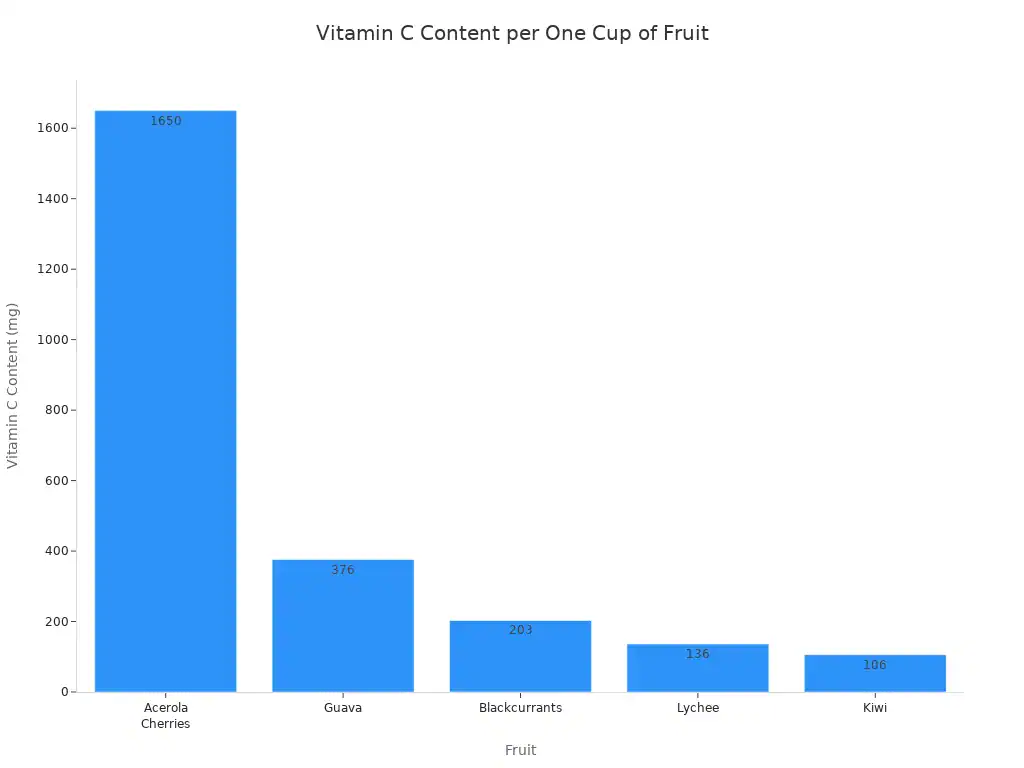
This impressive vitamin C content helps your body fight off illness.
Blood Sugar Regulation
Guava can also help you manage your blood sugar levels. Drinking Guava Leaf Tea with every meal has improved conditions like hypoadiponectinemia and hyperglycemia in human studies. It increases adiponectin levels and decreases HbA1c%. This suggests Guava Leaf Tea can act similarly to acarbose. It helps by consistently lowering blood glucose spikes after meals. It does this by stopping certain enzymes. Guava leaf extract also improves how your body uses insulin. It helps cells take in more glucose and store more glycogen. This extract boosts important signals related to insulin, like insulin receptor and glucose transporter 2. Flavonoids from guava leaf significantly lower fasting plasma glucose. They also improve how your body handles glucose in diabetic mice. These flavonoids reduce insulin resistance and lower bad cholesterol.
Antioxidant Power
Guava is rich in powerful antioxidants. These compounds protect your cells from damage. Phenolic compounds are the main antioxidants in guava. They stop free radicals from harming your body. Guava powder contains a lot of these compounds, with total phenolics measured at 44.04 mgGAE per gram. Fresh guava also has high levels, ranging from 158 to 447 mg GAE/100 g. From guava leaves, scientists have found quercetin, morin, and quercetin-3-O-glucopyranoside. Quercetin is the most active antioxidant among these. Morin and quercetin-3-O-glucopyranoside also help clean up harmful substances. These antioxidants contribute to guava’s overall health benefits.
Papaya Benefits
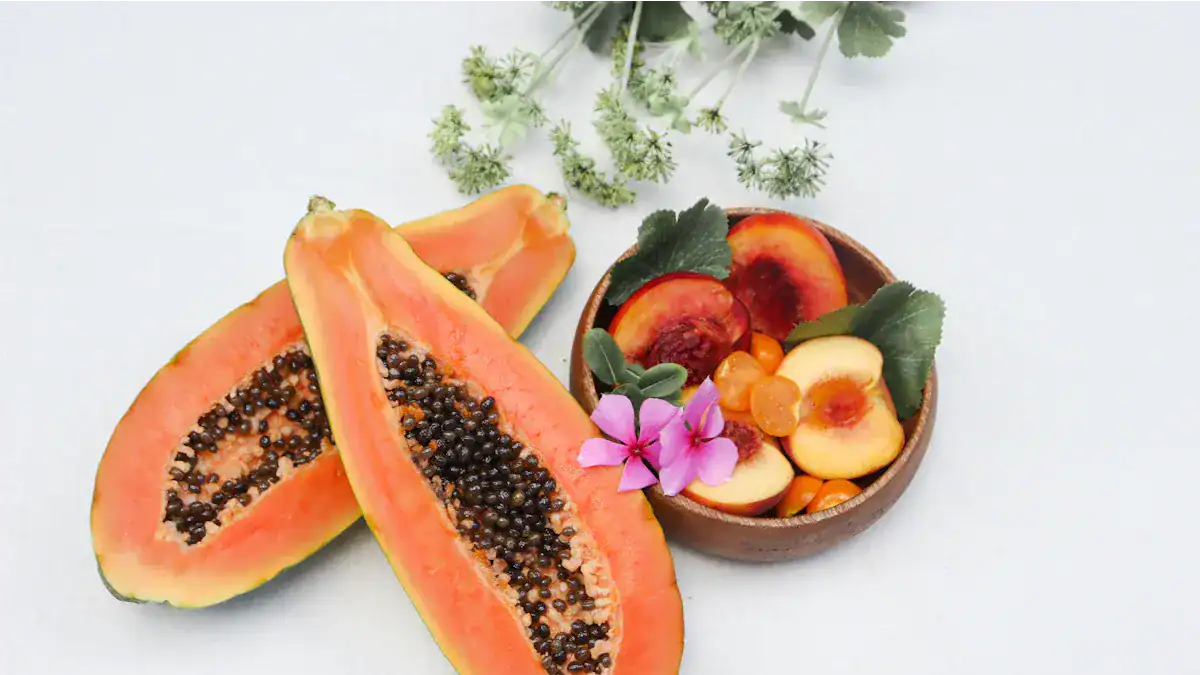
Digestive Health
Papaya is well-known for its digestive benefits. It contains a natural enzyme called papain. This enzyme helps your body break down proteins. Papain turns large proteins into smaller peptides and amino acids. This makes it easier for your digestive system to process and absorb nutrients. You can find relief from issues like indigestion, bloating, and gas, especially after meals. Papain may also help ease symptoms of GERD, such as acid reflux or heartburn. A blend of enzymes from ripened papaya supports daily healthy digestion. It aids in the digestion and absorption of proteins and carbohydrates. This promotes overall gastrointestinal wellness.
Skin Radiance
Papaya also helps your skin look radiant. It contains important vitamins that nourish your skin. Vitamin E provides antioxidant protection. It shields your skin from environmental damage. This vitamin also supports skin repair and regeneration. It promotes a healthier complexion. Vitamin E nourishes and protects your skin. It leaves your skin feeling soft and smooth. This antioxidant protection keeps your skin moisturized. Papaya’s natural properties contribute to improving skin texture and evening out skin tone. This enhances your overall skin health.
Nutrient Profile
Papaya is rich in many essential nutrients. It offers a good source of vitamins and minerals. You get Vitamin C, which boosts your immune system. Vitamin A is also present, important for good vision and skin. Papaya provides folate, a B vitamin vital for cell function. It also contains potassium, which helps maintain fluid balance. These nutrients work together to support your overall health and vitality.
Kiwi Benefits
Respiratory Health
Kiwi helps your respiratory system. It contains vitamin C and many antioxidants. These compounds are very good for your breathing. Research shows that eating kiwi and other citrus fruits can reduce wheezing. It can also lessen shortness of breath and night coughing in children. The antioxidants in kiwi fight stress and inflammation in your airways. This helps you breathe more easily. Kiwi is an excellent source of vitamin C and phenolic compounds. These substances have antioxidant and anti-inflammatory actions. They support your respiratory system.
Gut Microbiome
Kiwi is also great for your gut. Its fiber acts like a prebiotic. This means it feeds good bacteria in your intestines. It specifically helps beneficial bacteria like bifidobacteria and lactobacilli grow. This increases the variety of microbes in your gut. Eating kiwi regularly promotes these good bacteria. This helps maintain a healthy gut. The effects are temporary. Bacterial levels return to normal if you stop eating kiwi. Kiwi fiber also stimulates bifidobacteria in your gut. This shows kiwi can boost specific good bacteria. Eating different fiber sources helps keep your gut diverse and strong.
Sleep Support
Kiwi can help you get better sleep. It contains important vitamins and antioxidants. These nutrients support your body’s natural sleep cycles. Eating kiwi before bed might help you relax. It can lead to a more restful night. Kiwi is also high in Vitamin C and K, which contribute to overall well-being.
Star Fruit Benefits
Weight Management
Star fruit can be a helpful addition to your weight management plan. It has few calories and much fiber. This combination helps you feel full. It reduces your appetite. When you include star fruit in a balanced diet, it supports your weight management goals. Its fiber content also helps your digestion. It promotes satiety, which means you feel satisfied. This helps you avoid overeating. Star fruit is a nutritious, low-calorie choice. You can enjoy its sweet taste without harming your dietary goals. The fiber also aids digestion. It makes you feel full. This can lead to eating fewer calories overall.
Eye Health
Star fruit offers great benefits for your eyes. It contains important vitamins and antioxidants that support good vision.
Vitamin A: This vitamin is essential for overall eye health. It helps with vision function. It may also lower your risk of cataracts and macular degeneration.
Antioxidants: These compounds protect your retinal cells from damage. They can reduce the risk of age-related eye problems.
Vitamin C: This vitamin supports healthy blood vessels in your eyes. It ensures your eye tissues get proper nutrients.
Lutein + Zeaxanthin: These are special carotenoids and antioxidants. Your eye tissue concentrates them. They filter harmful blue light. They protect and maintain healthy cells in your eyes. These are the only two carotenoids found in high amounts in your retina.
Metabolic Support
Star fruit also supports your metabolism. It provides essential nutrients that help your body function well. These nutrients include B vitamins, which are important for converting food into energy. The fruit’s natural sugars give you a quick energy boost. Its fiber content helps regulate blood sugar levels. This prevents sudden spikes and crashes. A stable metabolism helps your body use energy efficiently. It keeps you feeling energetic throughout the day.
Acai Berry Benefits
Acai berries are small, dark purple fruits. Many people call them a “superfruit.” They offer many health benefits for your body.
Anti-Aging Effects
Acai berries can help with anti-aging. They contain many plant compounds. These compounds include anthocyanins. Anthocyanins give acai berries their dark color. They are strong antioxidants. Acai berries also have polyphenols like quercetin and catechin. These have anti-inflammatory and antioxidant properties. The many antioxidants in acai berries protect your cells. They fight free radicals that link to the aging process. These antioxidants act as radical scavengers. They keep your cells healthy and young.
Brain Function
Acai berries also support your brain. Acai extracts can reduce stress and inflammation in the brain. These factors can lead to problems with thinking. Studies show that acai can improve memory. It also reduces damage in the brain. Acai compounds protect brain cells from stress. This stress can mimic age-related problems. Acai helps your brain in several ways. It restores calcium balance. It also restores how your cells make energy. It stops bad protein clumps from forming. Acai berries reduce inflammation in the brain. They also improve blood flow to the brain. This helps your brain work better.
Antioxidant Rich
Acai berries are very rich in antioxidants. These powerful compounds protect your body’s cells. They fight off harmful molecules called free radicals. These free radicals can damage your cells. This damage can lead to various health problems. The high level of antioxidants in acai berries makes them special. They help keep your body strong and healthy.
Exotic fruits are truly nutritional powerhouses. They offer profound health benefits, boosting your immunity, aiding digestion, enhancing skin, and increasing energy. You can easily start incorporating exotic fruits into your diet today. Explore these unique fruits and experiment with different ways to enjoy them.
Here are practical ways to add them to your meals:
Method | Description |
|---|---|
Salads | Add mango or lychee to fresh salads for flavor. |
Smoothies | Blend exotic fruits with yogurt or juice for refreshing drinks. |
Desserts | Use dragon fruit or mangosteen in tarts or sorbets. |
Marinades | Papaya or kiwi purees tenderize meats. |
Embrace nature’s vibrant bounty for a healthier, more vital life.
FAQ
What defines an exotic fruit?
Exotic fruits are typically those not native to your region. They often come from tropical or subtropical climates. You find them less commonly in local grocery stores. These fruits offer unique flavors, textures, and nutrient profiles. They bring diversity to your diet.
What general health benefits do exotic fruits provide?
Exotic fruits are nutritional powerhouses. They boost your immunity with high vitamin C. They aid digestion with fiber and enzymes. Many contain unique antioxidants. These protect your cells and reduce inflammation. You gain overall wellness and vitality.
What are simple ways to add exotic fruits to your meals?
You can easily add exotic fruits to your diet. Try them in smoothies for a quick boost. Slice them into your morning yogurt or oatmeal. Add them to salads for a burst of flavor. You can also enjoy them as a refreshing snack on their own. 🥭🥝
What should you consider when trying new exotic fruits?
When trying new exotic fruits, start small. Taste a little first to check for allergies. Look for ripe fruits; they often have vibrant colors and a pleasant aroma. Research how to prepare them. Enjoy exploring new flavors and textures!



